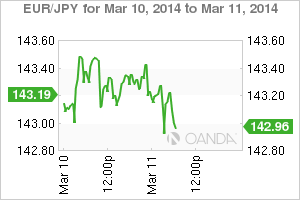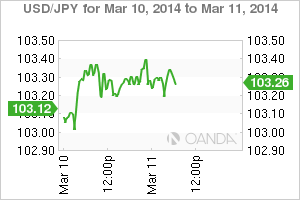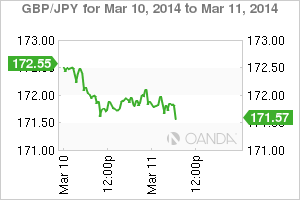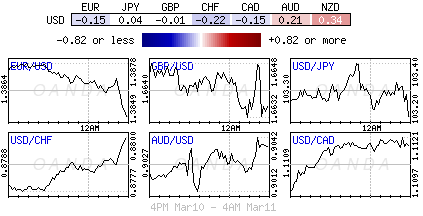Capital Markets are stuck between geo-political tension and economic event risk, between what's happening to the developed and developing markets, or what is otherwise know as "a dead zone" to investors for investment purposes. No matter, this downtime gives the market the opportunity to catch up with central bank thinking - it is they who have had the key to the handcuffs of volatility for the past 18-months. It's true, global monetary policy makers have not waivered or even deviated from their low rate, low inflation, and lower currency value banter - the global economy is just not strong enough to forgo any of the three anytime soon.
 EUR/JPY" title="EUR/JPY" align="bottom" border="0" height="200" width="300">
EUR/JPY" title="EUR/JPY" align="bottom" border="0" height="200" width="300">There were really no surprises from Governor Kuroda and company at the BoJ earlier today. As expected, the BoJ deferred on any further easing ahead of next months highly publicized sales tax increase. A percentage of the market remains weary about Japanese growth and on the outcome of another 'tax' being officially introduced. Would it have a negative effect on 'sustainable' growth or future consumption potential? Just more questions yet to be answered. Japanese policy makers maintained their overall economic assessment for a seventh consecutive meeting earlier this morning and reiterated to increase the monetary base at an annual increase of ¥60-70T (as expected). All the same whistle blowing despite Governor Kuroda admitting that exports have been weak and something to keep an eye on. However, the BoJ remains optimistic on the outlook for the Japanese economy. Hence, the no need for any policy readjustment anytime soon. The Japanese economy is on a steady track towards the +2% price goal and is expected to continue to grow far above the potential growth rate in 2014 and 2015. Helping policy makers is an economy experiencing near "full" employment - a situation like this would suggest that both wages and prices would eventually have to be pushed higher.
 USD/JPY" title="USD/JPY" align="bottom" border="0" height="200" width="300">
USD/JPY" title="USD/JPY" align="bottom" border="0" height="200" width="300">There was a small portion of the market certainly preparing itself for something different to be delivered by Kuroda and company. Many investors have been tentatively positioning themselves for some knock-on side effect from either - the higher sales tax beginning within weeks or from this weeks disappointing Q4 GDP release. The interested parties have got to be disappointed again, as the BoJ never even hinted that it would consider expanding its QE to keep the "sputtering Abenomics program on solid footing."
 GBP/JPY" title="GBP/JPY" align="bottom" border="0" height="200" width="300">
GBP/JPY" title="GBP/JPY" align="bottom" border="0" height="200" width="300">For any individual focusing on GDP, it was the Japanese economic minister - Amari - who sought to relieve their concerns after the downward Q4 GDP adjustments this week. He has urged investors to avoid turning pessimistic on the economy. This is certainly more difficult than assumed, and it does not help public psyche to be constantly remained by numerous media polls that some 55% of Japan shoppers will reduce spending levels once the sales tax hike goes into effect within days. For market perception, Kuroda and the BoJ will be required to be aggressively proactive to do more to support the economy if the results of a sales tax hike suggest that Abenomics could be derailed. Policy makers cannot afford to repeat history - a 1997 Japanese VAT quickly sent the Japanese economy into a tailspin very quickly.
The Yen bear still has a lot to play for (¥103.30). If one included the negative Yen rhetoric by Japanese policy makers this month, the long USD/JPY positions should be feeling more comfortable, they have yet to be hurt over the past few weeks. The failure of pair not to break down and through the bottom of its range on the back of the recent weaker US data (surety), or with the recent spat of "risk aversion" stemming from emerging markets can surely be seen as "strong" indicator to witness some further Yen weakness in the medium term.
